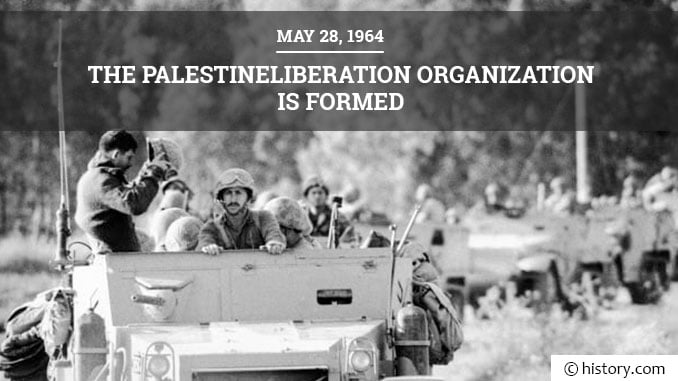The Palestine Liberation Organization (PLO) was created on May 28, 1964. The organization became associated with the demand for an independent state of Palestine. The PLO became recognized as the “sole legitimate representative of the Palestinian people” by the United Nations. At the close of World War I, the League of Nations was entrusted the responsibility of handling the region that would later become Israel, Jordan, the West Bank, and the Gaza Strip. The League of Nations handed what came to be known as the British Mandate to Britain for administration. In 1921, the British authorities divided this region and all the land to the west of River Jordan became the Palestine mandate. With the rise of Hitler and the Nazi party and anti-Semitic sentiments through the 1930s, Jewish immigration into Palestine started to peak. Alarmed by this sudden and mass influx, the Arabs of Palestine came into direct conflict with the Jews and clashes became increasingly violent and pronounced. The Arabs of Palestine were backed by other Arabs in the region. By the time Britain gave up its mandate in 1947 and the region came to be supervised by the United Nations directly, a two-nation solution had already started to evolve. The establishment of an Arab state and a Jewish nation seemed imminent. However, the Arabs rejected the proposal. On May 15, 1948, the Jews headed by David Ben-Gurion declared the foundation of Israel as an independent state. The formation of Israel brought things to a head. The political and military struggle against Israel was led by Egypt and supported heartily by other Arab nations. Following the Arab-Israeli war of 1948, the Palestinians realized that their resistance remained diffused due to the lack of a cohesive organized leadership. The political activity of the various organizations lacked coordination and remained weak and ineffective. In 1964, the Palestine Liberation Organization (PLO) [Munaẓẓamat al-Taḥrīr Filasṭīniyyah in Arabic] was created at the first Palestinian Arab conference held in Jerusalem as an umbrella political organization to unite the discordant Palestinian organizations and to represent the Palestinian Arabs who lived in mandated Palestine before the establishment of the State of Israel. Later, the organization grew to represent the rights of their descendants. Initially, the formation of the PLO was not seen as a significant effort in enhancing the cause of Palestinian self-determination. The Palestine National Charter, the organization’s guiding principles, included the complete removal of Israeli influence in Palestine. The PLO also refused to acknowledge the foundation of the State of Israel and marked it out as an enemy. Mr. Ahmed Al-Shuqairy became the first head of Palestine Executive Committee. The PLO, however, did not come into prominence till after the Six-Day War of June 1967. The Six-Day War of 1967 was an outcome of Russian intelligence reports to Syria announcing the deployment of Israeli troops on the Syrian border headed to an invasion. Despite being incorrect, the reports led to an alarmed Syria seeking out Egyptian support in preparation for war. In a sweeping pre-emptive move, Israel routed the Egyptian air force with missile power and caused major damage to Egyptian tanks deployed in the Sinai and Gaza regions. Syria ended up losing Golan Heights and Jordan had to part with East Jerusalem. In a war that lasted a mere 6 days, Israel had quadrupled its territory and declared Jerusalem as the country’s capital. The mass exodus of Palestinian refugees from Israel into refugee camps brought the PLO into sharp focus. Yasser Arafat took over as the leader of the PLO in 1969 and spearheaded a protracted guerrilla war against Israel from various bases in Jordan, Lebanon and other Arab countries. In the 1970s, the PLO pursued terrorism as a strategy, though this was publically denied. Towards the end of the 1970s, however, Arafat started to chalk out his goal of attaining the world community’s acceptance of the PLO as the legitimate representative of the Palestinian people. The PLO was granted a full membership in the Arab League in 1976. Israel invaded Lebanon in June 1982 in an attempt to destroy the PLO bases in the country and the PLO headquarters in the Lebanese capital of Beirut. PLO was subsequently forced to evacuate Beirut. In 1987, the outbreak of the popular uprising, intifā ah, led the PLO leaders to consider negotiations with Israel. On November 15, 1988, the PLO declared the State of Palestine, quasi-state and the following year Arafāt was elected its president, thus crystalizing the two-nation solution. The PLO, however, alienated its major financial aid providers in 1990 by deciding to support Iraq during the Persian Gulf War. In 1993, Israel and the PLO signed their first set of agreements called the Oslo Accords. Despite sporadic success, the negotiation failed with the outbreak of the Al-Aqṣā intifā ah in the first decade of the 2000s, with Hamas threatening to overshadow the PLO in Palestine. The PLO’s efforts gained Palestine an observer state status at the United Nations in 2012. Also On This Day: 1908 – James Bond creator, Ian Fleming, is born 1918 – The Democratic Republic of Azerbaijan is established. 1937 – Volkswagen is founded. 1940 – Belgium surrenders to Germany in World War II. 1961 – Amnesty International is founded.
May 28 1964 – The Palestine Liberation Organization is Formed
The Palestine Liberation Organization (PLO) was created on May 28, 1964. The organization became associated with the demand for an independent state of Palestine. The PLO became recognized as the…
783
